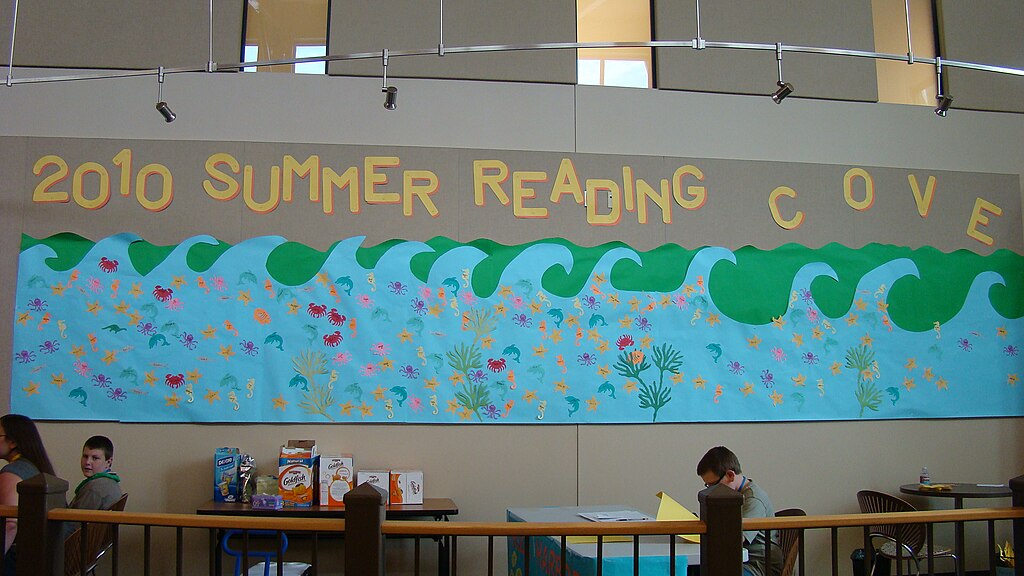
Bonner Springs City Library, Bonner Springs, Kentucky, via Wikimedia Commons. Licensed under CC BY 2.0,
A passage about LA (“ellay”) from Henry Hoke’s Open Throat, a novel narrated by a mountain lion:
the bright world below the park at night is a blur to me when I try to look out over it
but if I get close enough to a creature’s eye I can see what it sees and in the owl’s eye I see ellay clearly
more lights than I could ever count stretch out into the darkness and don’t stop stretching
I’m scared of how far they go
—Spencer Quong, business manager
From the fifties travel book The Crying of the Wind: Ireland, by Ithell Colquhoun:
Slender-legged colts stepped down the opposite bank to drink; they pawed the water nervously, seeming to want it muddy before tasting it. Perhaps they were not thoroughbreds, but they had a wild grace now seldom seen in English fields. None the less, I was thankful that the wide expanse of the current divided me from them, for I regard any horse as a psychotic with homicidal tendencies and prefer to avoid close quarters.
—Jane Breakell, development director
From the rollicklingly pleasurable Dud Avocado by Elaine Dundy, which genuinely had me laughing out loud:
Looking back, I don’t know anyone he’d actually been wrong about—except of course me, but then as we know I am totally incomprehensible to everyone including myself.
—Sophie Haigney, web editor
The fourth sentence of Jack Skelley’s stoned-but-hyperactive The Complete Fear of Kathy Acker:
Anyway, I’m hearing this music in my head as I’m walking down the Mallway, and I see this paraplegic in a wheelchair, and he’s glaring at me with all the hatred he has, and the wheelchair motor is making this horrible screeching grinding sound, like some dentist drill piercing my skull, and I’m walking past this table set up by these right-to-lifers with all these pictures of unborn babies staring out at you utterly forlorn, and I’m just absorbing all this kind of stuff, and I’m thinking this is America and it doesn’t really feel too safe or good or anything anymore, because these Mall walls could come crashing down any minute in the slightest California earthquake—not to mention the inevitable nuclear holocaust, which I dreamed about again last night—the blast so loud it woke me up.
—Olivia Kan-Sperling, assistant editor
Two sentences from Robert Glück’s Jack the Modernist:
My childhood needed many secrets and secret places to lend depth to my loneliness but at heart I was totally prosaic about my suffering and its attendant strategies of goodness and solitude; it was like standing in line at the bank for x number of years.
My misfortune was that I lacked Jack’s love; Jack’s cock was the toothpick that stabilized my club sandwich of being and nothingness.
—Amanda Gersten, associate editor
From Crapalachia by Scott McClanahan, a coming-of-age memoir and a portrait of rural West Virginia:
The people worked in restaurants so that tourists could laugh at their accents. They were paying for something that was given for free. The people from here didn’t have to run a river to prove that it existed. They didn’t have to climb a mountain just to climb it. It was enough that the river was a river and the mountain was a mountain and inside of them were mountains too.
—Anna Rakhonen, intern
From Geoff Dyer’s Jeff in Venice, Death in Varanasi, the type of book that heightens your sense that it is summer, and you’re living it:
You came to Venice, you saw a ton of art, you went to parties, you drank up a storm, you talked bollocks for hours on end and went back to London with a cumulative hangover, liver damage, a notebook almost devoid of notes and the first tingle of a cold sore.
—Camille Jacobson, engagement editor
From Gayl Jones’s The Birdcatcher, about a love triangle featuring a murderous artist:
He was silent, observing me.
“There’s almost nothing I wouldn’t do for you; you know that,” he said.
I heard the “almost.” Does every woman hear the “almost”?
—Izzy Ampil, intern
From Note-Book of Anton Chekhov, translated by S. S. Koteliansky and Leonard Woolf, found in a lovely used bookstore in Great Barrington, Massachusetts:
The most intolerable people are provincial celebrities.
—Andrew Martin, editor at large
from The Paris Review https://ift.tt/KUrtZ75
Comments
Post a Comment